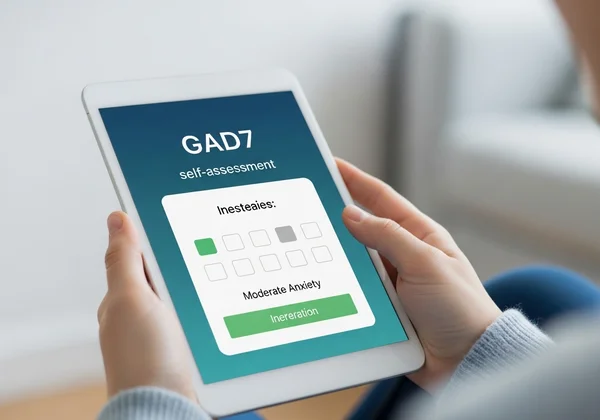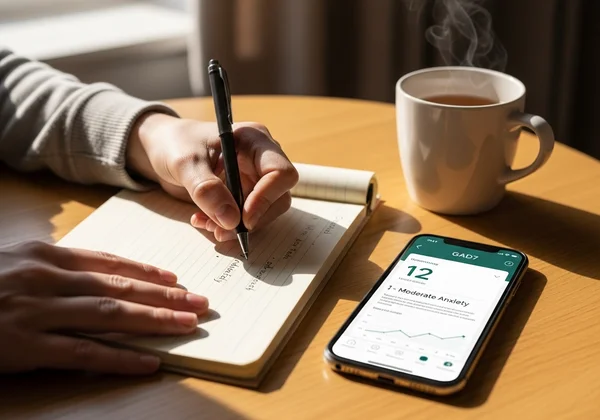GAD7 & Your Doctor: Discussing Anxiety Effectively
September 2, 2025 | By Fiona Hayes
Taking the first step towards addressing anxiety can feel overwhelming, especially when it involves talking to your doctor. You've used a tool like the GAD7 self-assessment, and you have a result in your hand, but now you might be wondering, what comes next? This guide offers practical steps and builds your confidence, helping you navigate an open, productive conversation about your anxiety and GAD7 results with your healthcare provider. Understanding your symptoms is the beginning, and this conversation is the next crucial step on your mental health journey.
If you haven't yet, you can take our confidential and free GAD7 self-assessment to get a clear starting point. This quick, scientifically validated screening can provide valuable insights that help structure your discussion. It's a powerful tool for turning vague feelings of worry into a concrete piece of information you can share.

Preparing for Your Anxiety Doctor Appointment
A successful doctor's visit often begins before you even walk into the office. Being prepared can reduce your own nervousness and ensure you cover all the important points during your limited time. Think of it as gathering evidence to help your doctor understand your experience fully. A clear picture allows for a more accurate assessment and a more effective plan forward.
What Information Should You Gather Beforehand?
To make your conversation as effective as possible, compile a small file of information. Your doctor will appreciate your preparedness, and it ensures you don't forget anything important under pressure.
- Your GAD7 Score and Report: Bring your score and its interpretation (e.g., mild, moderate, severe). If you used our platform to receive the optional AI-powered personalized report, print it out or have it ready on your phone. This report offers deeper insights that can be incredibly helpful.
- A List of Your Symptoms: Go beyond just "anxiety." Write down specific physical sensations (like a racing heart, upset stomach, or muscle tension), emotional feelings (like dread, irritability, or a sense of panic), and behavioral changes (like avoiding social situations or procrastinating on tasks).
- Timeline and Triggers: Note when your symptoms started. Have they gotten worse over time? Are there specific situations, people, or times of day that seem to make your anxiety worse? Are there things that make it better?
- Impact on Daily Life: How is this affecting your work, relationships, sleep, or ability to enjoy hobbies? Be specific. For example, "I'm having trouble concentrating at work and have missed two deadlines," is more informative than "I'm stressed."
- Your Questions: Write down any questions you have for your doctor. We’ll cover some key ones later in this article.
How to Articulate Your Feelings and Symptoms Clearly
Talking about feelings can be difficult, but clear communication is key. Start by using "I" statements to describe your experience. For example, say "I feel a constant sense of worry," rather than "Anxiety is making me worried." This centers the conversation on your personal experience.
Practice describing your symptoms with a trusted friend or even just to yourself in the mirror. It can feel strange at first, but it helps you find the right words and builds confidence. Remember, your doctor is a professional who talks about these topics every day. There is no right or wrong way to feel, and their role is to help, not to judge. Having taken the GAD7 already shows you are being proactive about your health.

Discussing Your GAD7 Score with Your Doctor
With your preparation complete, it's time to focus on the conversation itself. Your GAD7 score is an excellent, objective starting point. It's a bridge that connects your inner feelings to a language that healthcare professionals recognize and respect. This isn't just a random online quiz; it's a clinical tool.
Explaining What the GAD7 Is and Your Score's Meaning
You can open the conversation easily and directly. You don't need to be an expert on the GAD7 test. Simply state the facts.
You could say something like: "I've been feeling very anxious lately, so I took a widely used anxiety screening tool online called the GAD7. My score was a [your score], which the interpretation suggested falls into the [mild/moderate/severe] range. I'd like to discuss what this means and what my next steps should be."
This approach immediately gives your doctor context. It shows that you've done some initial research and are taking your symptoms seriously. It frames the conversation around a shared data point, making it easier for both of you to explore the issue. If you're looking to refresh your memory on the GAD7 or its scoring, you can always understand your score on our website.
Key Questions to Ask Your Doctor About Your Anxiety
An appointment is a two-way conversation. Asking questions empowers you to be an active participant in your own care. Here are some essential questions to have ready:
- Based on my GAD7 score and the symptoms I've described, what is your initial assessment?
- Could there be any physical health issues contributing to these feelings?
- What are the next steps for a more formal evaluation, if needed?
- What are my treatment options? Can you tell me about therapy, medication, and lifestyle changes?
- Do you have any resources or specialists you can recommend?
- What can I do at home to start managing these symptoms right now?
Write down the answers so you can review them later. It’s easy to forget details when you’re feeling anxious.

Understanding Next Steps After Your Doctor's Visit
The conversation with your doctor is the beginning of a process. After the appointment, you will have a clearer path forward. This path will be unique to you but will likely involve further evaluation, creating a treatment plan, and establishing ongoing support.
What if Your Doctor Recommends Further Evaluation or Treatment?
Based on your discussion, your doctor might suggest several paths. They may recommend a referral to a mental health professional, such as a psychologist, therapist, or psychiatrist, for a comprehensive diagnostic evaluation. The GAD7 is a screener; these professionals provide the diagnosis.
Treatment recommendations often include psychotherapy (talk therapy), such as Cognitive Behavioral Therapy (CBT), which is highly effective for anxiety. In some cases, medication may be discussed as an option to help manage symptoms. Your doctor may also suggest lifestyle adjustments related to sleep, nutrition, and exercise. View these recommendations as positive steps toward feeling better. The data from our online GAD7 tool helped open this door.
The Importance of Follow-Up and Ongoing Support
Managing anxiety is rarely a one-time fix; it's an ongoing journey of learning and adjustment. Be sure to schedule any follow-up appointments your doctor recommends. This is crucial for monitoring your progress, adjusting treatments as needed, and ensuring you feel supported.
Continue to use the tools that help you. Your support system isn't just professionals; it includes friends, family, and resources that empower you. Continue to educate yourself about anxiety and celebrate the small victories along the way. Taking that first step to talk to your doctor is a huge victory in itself.
Your Journey Forward
Stepping forward to discuss your anxiety with your doctor is a truly courageous and pivotal moment in your mental health journey. With your GAD7 results and thoughtful preparation, you're not just facing vague fears – you're transforming them into a clear, manageable health conversation. Remember, you're your own best advocate, and you've equipped yourself for a productive discussion that can lead to the support you deserve.
Remember, this is the beginning of understanding and managing your anxiety effectively. If you ever need to check in on your symptoms or want to see your progress, you can always start your assessment again. It’s a confidential and reliable resource for your mental health toolkit.

Frequently Asked Questions About GAD7 & Doctor Discussions
Is the GAD7 a diagnostic tool for anxiety?
No, the GAD7 is a highly reliable and clinically validated screening tool, not a diagnostic tool. It identifies the presence and severity of common anxiety symptoms. A formal diagnosis for conditions like Generalized Anxiety Disorder can only be made by a qualified healthcare professional after a comprehensive evaluation.
What should I do if my GAD7 score is concerning?
A concerning score (typically in the moderate to severe range) is a strong indicator that you should schedule an appointment with a healthcare provider. Use the score and the advice in this article as the foundation for that conversation. Don't panic; instead, see the score as a clear signal to seek professional support. You can always get your GAD7 score to have a baseline before your visit.
How accurate is the GAD7 test in a clinical context?
The GAD7 is considered very accurate for screening and measuring symptom severity for Generalized Anxiety Disorder and other anxiety disorders. Developed by Drs. Robert L. Spitzer, Kurt Kroenke, and Janet B.W. Williams, it is used by clinicians worldwide due to its strong reliability and validity in reflecting a patient's self-reported anxiety levels over the previous two weeks.
What if my doctor seems to dismiss my GAD7 results?
Your feelings and concerns are valid. If you feel your doctor is not taking your GAD7 results or your symptoms seriously, it is okay to seek a second opinion. You have the right to a healthcare provider who listens to you and partners with you in your health journey. Look for a doctor or a mental health professional who makes you feel heard and respected.